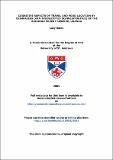Cognitive aspects of travel and food location by chimpanzees (Pan troglodytes schweinfurthii) of the Budongo Forest Reserve, Uganda
Abstract
Finding food in tropical forests poses a potentially major problem for chimpanzees, whose
ranging is thought primarily to be directed at locating suitable food resources: (1)
chimpanzees are frugivorous, large bodied and live in large home ranges; (2) they lack
specialised sensory or locomotor abilities, and terrestrial travel is known to be costly; but
(3) fruits are randomly distributed in space and time. Evidence from studies of captive
individuals suggests chimpanzees are capable of remembering the locations of out of sight
resources and can compute least distance routes to these resources, but whether this ability
translates to the natural foraging behaviour of wild chimpanzees has never been
investigated. My observational study was designed to assess how the chimpanzees (Pan
troglodytes schweinfurthii) of Budongo Forest, Uganda, locate these patchy resources.
I mapped the routes of 14 focal individuals over a 12-month period. I considered how
these foraging routes were structured by breaking the path into segments of travel between
resources. Consecutive segments of travel between resources were found not to be
independent, but assembled into "super-segments" that take in a number of resources along
one trajectory. These super-segments are not necessarily directed towards feeding
resources, however: travel is not always food directed. Comparisons of actual chimpanzee
routes with randomly generated simulations suggest most individuals do not attempt to
minimise their travel distances. There is evidence to suggest energetically stressed
individuals can remember the locations of recently visited food resources and return to
these patches in order to minimise travel distances when necessary, but overall, food is not
difficult to find for this community of chimpanzees. I propose this is because males defend
a territory with super-abundant food resources, meaning availability is not a limiting factor
of foraging. Male chimpanzees can be characterised as convenience feeders, taking food
whilst satisfying other, social needs.
Type
Thesis, PhD Doctor of Philosophy
Collections
Items in the St Andrews Research Repository are protected by copyright, with all rights reserved, unless otherwise indicated.

